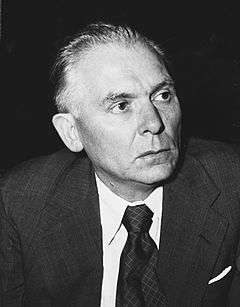Imre Horváth
| Imre Horváth | |
|---|---|
 | |
| Minister of Foreign Affairs of Hungary | |
|
In office 30 July 1956 – 2 November 1956 | |
| Preceded by | János Boldóczki |
| Succeeded by | Imre Nagy |
|
In office 4 November 1956 – 2 February 1958 | |
| Preceded by | Imre Nagy |
| Succeeded by | Endre Sík |
| Personal details | |
| Born |
19 November 1901 Budapest, Austria-Hungary |
| Died |
2 February 1958 (aged 56) Budapest, People's Republic of Hungary |
| Political party | MKP, MDP, MSZMP |
| Profession | politician, engineer |
Imre Horváth (19 November 1901 – 2 February 1958) was a Hungarian politician, who served as Minister of Foreign Affairs twice: in 1956 and after the Hungarian Revolution of 1956 until his death. In 1918 he joined to the Communist Party of Hungary (KMP) and in spite of his young age he was one of the organizer of the labour movements. During the Hungarian Soviet Republic he worked for the political police. After the fall of the communist system he was interned. After the prison he made a connection with the illegal communist party. That's why he was imprisoned again and sentenced to ten years. He got into the Soviet Union with the occasion of a prisoner exchange. Here Horváth finished his studies and worked as an engineer. He returned to home in 1933 but arrested at soon. He spent ten years in prison at Szeged.
In 1944 the Nazis carried him to Dachau. In the next year he came back to Hungary. He worked for some embassys. He was the Minister of Foreign Affairs between 1956 and 1958, except the Revolution of 1956 when Imre Nagy held this position. Horváth was the leader of the Hungarian delegation to the United Nations after the revolution.
References
| Wikimedia Commons has media related to Imre Horváth. |
| Diplomatic posts | ||
|---|---|---|
| Preceded by Elek Bolgár |
Envoy extraordinary to the United Kingdom 1951–1953 |
Succeeded by János Katona |
| Political offices | ||
| Preceded by János Boldóczki |
Minister of Foreign Affairs 1956 |
Succeeded by Imre Nagy |
| Preceded by Imre Nagy |
Minister of Foreign Affairs 1956–1958 |
Succeeded by Endre Sík |